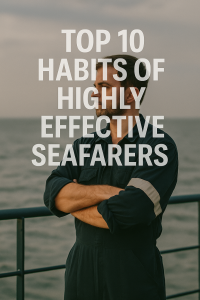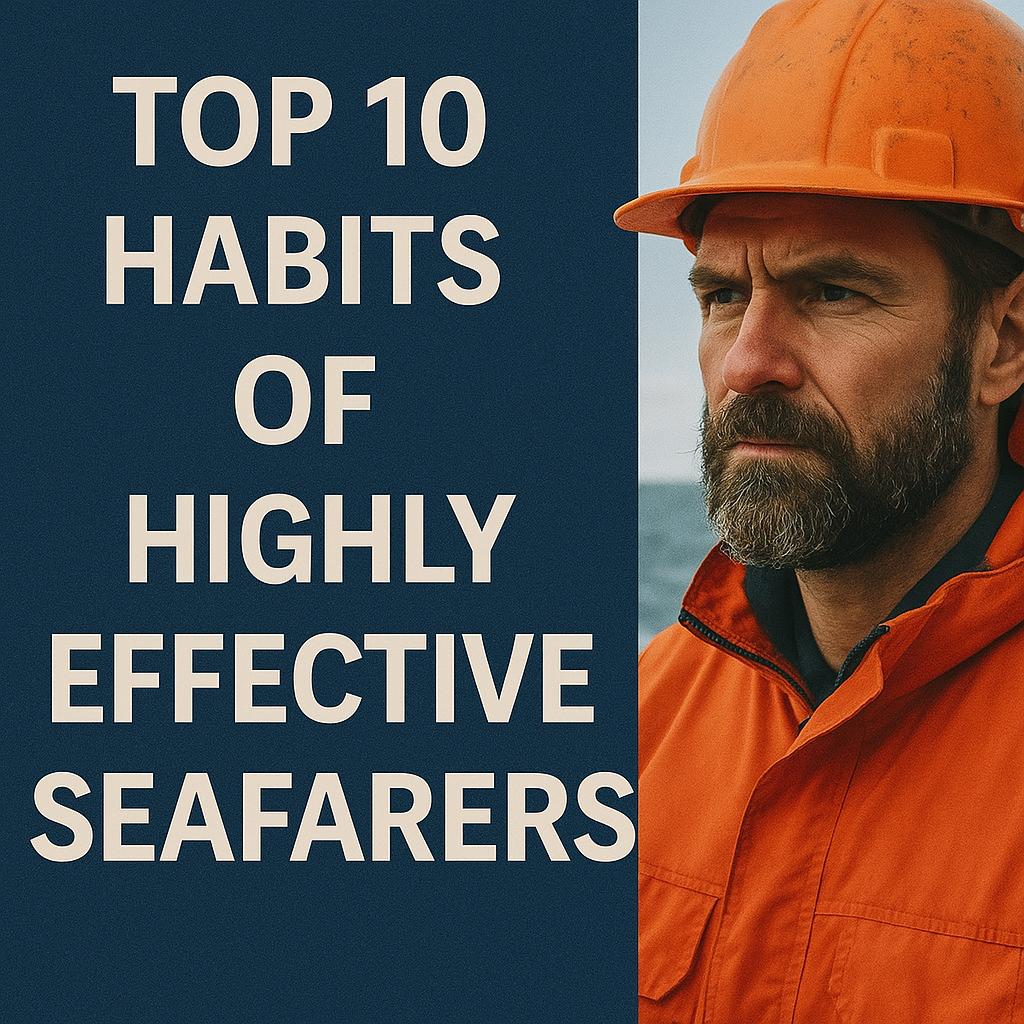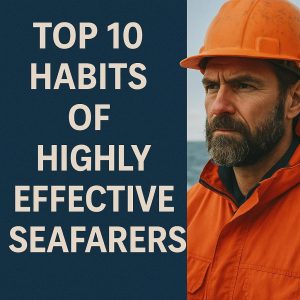Discover the top 10 habits of highly effective seafarers. Learn how these essential practices shape successful maritime careers, enhance safety, and foster professional excellence onboard.
Why Good Habits Matter in Modern Maritime Operations
Life at sea demands more than technical know-how. A successful seafarer must navigate not just oceans, but also complex systems, multicultural crews, mental and physical fatigue, and high-stakes emergencies. In such an environment, habitual discipline, mindset, and behavior often make the difference between a good mariner and a great one.
According to a 2023 report by the International Chamber of Shipping (ICS), more than 75% of marine incidents can be traced to human factors, including fatigue, miscommunication, and poor decision-making. While procedures and regulations such as STCW and SOLAS provide a framework, it’s the daily habits of the crew that ensure ships operate safely and efficiently.
This article explores the top 10 habits of highly effective seafarers, supported by real-world examples, expert insights, and links to maritime best practices.
1. They Maintain a Proactive Safety Mindset
Effective seafarers do more than follow safety protocols—they live them. From wearing PPE during a routine inspection to double-checking an isolation valve, they view safety as a mindset, not a mandate.
Real-World Example:
A 2021 incident report from the UK’s Marine Accident Investigation Branch (MAIB) detailed how a proactive AB prevented an engine room fire by reporting minor oil seepage—something easily overlooked.
Link: MAIB Safety Bulletins
2. They Communicate Clearly and Respectfully
Onboard communication is the nervous system of any ship. Effective seafarers:
-
Use standard maritime English (as per IMO SMCP)
-
Practice closed-loop communication during critical operations
-
Bridge cultural gaps with empathy and clarity
Fact: A study published by the Nautical Institute found that language barriers and cultural misunderstandings contribute to nearly 20% of navigational near-misses.
3. They Master Time and Task Management
Highly effective seafarers understand the importance of:
-
Timely watch handovers
-
Prioritizing maintenance tasks
-
Keeping accurate logs and checklists
Comparison: Just as air traffic controllers follow structured handovers, seafarers rely on clear watchkeeping transitions to prevent incidents, as reinforced by STCW Code A-VIII/2.
4. They Stay Physically and Mentally Fit
A fit body and a resilient mind are non-negotiables for seafarers. Effective crew members:
-
Participate in shipboard fitness routines
-
Monitor fatigue and sleep hygiene
-
Know when to seek mental health support
Recent Development:
In 2022, Lloyd’s Register Foundation collaborated with ISWAN to publish mental health best practices, addressing rising depression and isolation cases among seafarers during the COVID-19 crew change crisis.
Source: ISWAN – Seafarer Mental Health Resources
5. They Demonstrate Continuous Learning and Adaptability
Maritime technology is evolving rapidly—from E-navigation and digital logbooks to remote engine diagnostics and alternative fuels. Top seafarers keep up by:
-
Completing STCW refreshers and type-specific training
-
Engaging in e-learning (e.g., Seably, Videotel)
-
Asking questions and mentoring juniors
IMO Reference: Model Course 1.39 on leadership promotes a culture of ongoing learning onboard.
6. They Uphold Strong Ethical and Environmental Standards
With stricter enforcement of MARPOL Annexes and IMO 2023 fuel emission regulations, integrity is crucial. Effective seafarers:
-
Report discrepancies (e.g., OWS tampering, logbook falsification)
-
Dispose waste per MARPOL protocols
-
Lead by example in preventing illegal discharges
Case Study:
A 2020 DNV audit found that crew-led initiatives to separate waste and reduce single-use plastics onboard led to a 30% reduction in garbage discharge incidents.
7. They Observe and Learn from Experience
Rather than relying solely on manuals, top performers observe senior engineers, officers, and operations. They:
-
Learn by doing during drills
-
Reflect after every critical maneuver or error
-
Log what they’ve learned for future reference
Example:
A third engineer logs compressor trips during dry dock, noting patterns—this helps him troubleshoot better on live voyages.
8. They Support Crew Cohesion and Morale
In isolated environments, effective seafarers become morale boosters. They:
-
Celebrate cultural festivals onboard
-
Include cadets in daily routines
-
De-escalate interpersonal conflicts early
Insight: A 2022 IHS Markit report showed a direct link between crew harmony and retention, especially in multinational crew environments.
9. They Respect Hierarchies While Sharing Ideas
Highly effective seafarers understand the chain of command, but they also speak up when it counts—especially on safety matters.
Analogy: Think of the ship as an orchestra. Everyone follows the conductor (Captain/Chief Engineer), but each player’s feedback shapes the harmony.
10. They Prepare for the Unexpected
Whether it’s a MOB drill, a sudden engine blackout, or a storm reroute, great seafarers:
-
Maintain readiness for drills and inspections
-
Know emergency stations, SOPs, and alarm systems
-
Mentally rehearse critical responses
Compliance: As per SOLAS Chapter III, lifeboat and fire drills must be conducted weekly—effective seafarers take these seriously, not symbolically.

Case Study: The Role of Habit in Avoiding a Collision
In 2019, a chemical tanker avoided collision in dense fog thanks to the OOW’s routine habit of comparing ECDIS routes with radar and visual bearings—even when autopilot was active. Post-incident analysis credited the officer’s vigilance and cross-verification habit with averting a catastrophic incident.
FAQ: Habits and Seafarer Performance
Q1: Can cadets develop these habits early on?
A: Absolutely. These are learned behaviors, not traits. Cadets who shadow officers, participate actively in drills, and reflect on feedback are already building these habits.
Q2: Are these habits part of STCW training?
A: Many are embedded indirectly in STCW Tables A-VI/1, A-III/1, and A-II/1 (safety, leadership, watchkeeping), though they often go beyond what’s in the syllabus.
Q3: How do companies evaluate these habits?
A: Through performance appraisals, peer reviews, and incident reports. Increasingly, companies are also using psychometric tools to assess soft skills.
Q4: Are there tools to help develop seafarer habits?
A: Yes—apps like WellAtSea, MarCoWell, and Seably offer behavioral tracking, training modules, and wellness routines.
Q5: Do these habits affect promotion?
A: Strongly. Promotions hinge not only on competence but also on judgment, leadership, and reliability—all rooted in effective daily habits.
Conclusion
The maritime profession is more than charts, engines, and logbooks. It is a discipline of character—one forged through habits of responsibility, reflection, and resilience.
The top 10 habits explored here are not checkboxes for appraisals but compasses for lifelong success at sea. From safety consciousness and lifelong learning to emotional intelligence and emergency preparedness, these behaviors define the professionals who lead, inspire, and navigate the maritime world forward.
Call to Action: Want to build a more effective onboard culture? Explore our Maritime Habits Workbook for seafarers, cadets, and officers.
References
-
International Chamber of Shipping. (2023). Human Factors in Maritime Safety. https://www.ics-shipping.org
-
IMO. (2023). STCW and SOLAS Resources. https://www.imo.org
-
ISWAN. (2022). Mental Health Resources for Seafarers. https://www.seafarerswelfare.org
-
DNV. (2020). Maritime Safety Audit Reports. https://www.dnv.com
-
IHS Markit / S&P Global. (2022). Crew Retention & Morale Study. https://ihsmarkit.com


